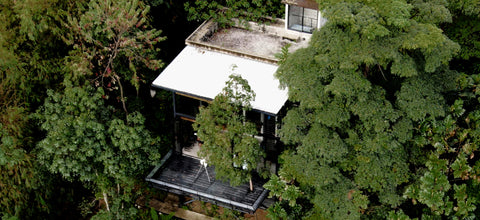PLACE
Escape the city: 12 Hours in PulaiTree
A quiet retreat just an hour's drive from Kuala Lumpur
14 July 2023, Written By Stephanie Peh
Photographed by Jonathan Lim, Lin Ho & Teoh Chee Keong
Past the meandering paths up a hill in Kuala Kubu Bahru (KKB), Malaysia, we arrived late afternoon at PulaiTree, a quiet retreat just an hour's drive from Kuala Lumpur. Despite the proximity to the capital city, the landscape is an entirely different picture: Void of skyscrapers, city pollution and traffic sounds, we have entered a paradise of endless greenery and fresh air underscored by the song of birds. Stepping foot into the property, we settle quickly on lounge chairs by the open deck, which feels like a treehouse with an elevated vantage point. A warm cup of tea in hand, we watched as the sun sets against the rainforest—a view that revives even the weariest of souls. As conversations flow, dark and heavy clouds gently bypass, inviting a cool breeze into the deck and leaving after a misty fog that shrouds the forest with a mystical veil. Witnessing the majestic changes of mother nature so up close is enough to temporarily erase one's worries and reset the mind.
Owned and managed by socially-conscious creative studio 3nity, PulaiTree was conceived to invite people to reconnect with nature. “Our concept was simple: This place has a good view and many trees. Let’s not sacrifice any of them,” says 3nity’s founding director, Joseph Foo, who added that developers typically tend to cut down trees to make the land barren so it is easier to build—something they wanted to avoid. In fact, the retreat was named after the three pre-existing Pulai trees on site. They even cut a hole in the roof to not disturb the growth of a young rubber tree, which has matured by now.
For the construction of the minimalist structure with an open-shed concept, 3nity worked closely with like-minded architect friends at Tetawowe. They decided from the get-go that whatever they build had to thread the ground lightly, co-existing with nature rather than disrupting the terrain. “Every time we build something in the forest, we are disturbing nature,” says Wei Ping, co-founder of Tetawowe. Lodged on a sloping site, the retreat was kept small and lightweight, yet spacious enough for six to eight people to enjoy time together.
Keeping the carbon footprint low, the structure was built using local materials. With steel frames and stilt columns as support, the barefaced concrete block seems to disappear into the environment. Over time, flora and fauna have climbed all over, hiding the property from plain sight. Inside, glass windows blur the interior and exterior, inviting occupants to become one with nature as they are surrounded by trees everywhere. “You would never imagine that a place like this exists not far away from the city,” says Foo.
At PulaiTree, there is not much to do except admire the unkempt forest, disconnect with a book or fire up the barbecue pit for some satay under the moonlight. That night, we fell asleep early and awoke at sunrise—a perfect time for a dip in the pool where sunlight cast shimmering crystals and dancing shadows of rustling leaves.

Recharged from a good night’s rest, we make our way down the hill to KKB, a small, century-old town nearby defined by four lines of quaint colonial shophouses sparsely decorated with street art that tell stories of its fascinating history. Till today, the place does not conform to the rules of modern living or gentrification. An old market sits at the heart, retailing fresh fruits, vegetables and spices—some cultivated in the backyard of its sellers. It sits diagonally across a pink corner shophouse where a middle-aged native sells al dente noodles with handmade dumplings. Down the street, one finds an old barber shop with faded hand-painted signages, a testament to time, much like the cha chaan teng across that is plastered with the vinyl sleeves of 70s pop stars and grandfather clocks that don’t tell the right time—as if inviting one to forget about it.


Book a stay at PulaiTree here

Photographed by Jonathan Lim, Lin Ho & Teoh Chee Keong
Past the meandering paths up a hill in Kuala Kubu Bahru (KKB), Malaysia, we arrived late afternoon at PulaiTree, a quiet retreat just an hour's drive from Kuala Lumpur. Despite the proximity to the capital city, the landscape is an entirely different picture: Void of skyscrapers, city pollution and traffic sounds, we have entered a paradise of endless greenery and fresh air underscored by the song of birds. Stepping foot into the property, we settle quickly on lounge chairs by the open deck, which feels like a treehouse with an elevated vantage point. A warm cup of tea in hand, we watched as the sun sets against the rainforest—a view that revives even the weariest of souls. As conversations flow, dark and heavy clouds gently bypass, inviting a cool breeze into the deck and leaving after a misty fog that shrouds the forest with a mystical veil. Witnessing the majestic changes of mother nature so up close is enough to temporarily erase one's worries and reset the mind.
Owned and managed by socially-conscious creative studio 3nity, PulaiTree was conceived to invite people to reconnect with nature. “Our concept was simple: This place has a good view and many trees. Let’s not sacrifice any of them,” says 3nity’s founding director, Joseph Foo, who added that developers typically tend to cut down trees to make the land barren so it is easier to build—something they wanted to avoid. In fact, the retreat was named after the three pre-existing Pulai trees on site. They even cut a hole in the roof to not disturb the growth of a young rubber tree, which has matured by now.
For the construction of the minimalist structure with an open-shed concept, 3nity worked closely with like-minded architect friends at Tetawowe. They decided from the get-go that whatever they build had to thread the ground lightly, co-existing with nature rather than disrupting the terrain. “Every time we build something in the forest, we are disturbing nature,” says Wei Ping, co-founder of Tetawowe. Lodged on a sloping site, the retreat was kept small and lightweight, yet spacious enough for six to eight people to enjoy time together.
Keeping the carbon footprint low, the structure was built using local materials. With steel frames and stilt columns as support, the barefaced concrete block seems to disappear into the environment. Over time, flora and fauna have climbed all over, hiding the property from plain sight. Inside, glass windows blur the interior and exterior, inviting occupants to become one with nature as they are surrounded by trees everywhere. “You would never imagine that a place like this exists not far away from the city,” says Foo.
At PulaiTree, there is not much to do except admire the unkempt forest, disconnect with a book or fire up the barbecue pit for some satay under the moonlight. That night, we fell asleep early and awoke at sunrise—a perfect time for a dip in the pool where sunlight cast shimmering crystals and dancing shadows of rustling leaves.

Recharged from a good night’s rest, we make our way down the hill to KKB, a small, century-old town nearby defined by four lines of quaint colonial shophouses sparsely decorated with street art that tell stories of its fascinating history. Till today, the place does not conform to the rules of modern living or gentrification. An old market sits at the heart, retailing fresh fruits, vegetables and spices—some cultivated in the backyard of its sellers. It sits diagonally across a pink corner shophouse where a middle-aged native sells al dente noodles with handmade dumplings. Down the street, one finds an old barber shop with faded hand-painted signages, a testament to time, much like the cha chaan teng across that is plastered with the vinyl sleeves of 70s pop stars and grandfather clocks that don’t tell the right time—as if inviting one to forget about it.


Book a stay at PulaiTree here








